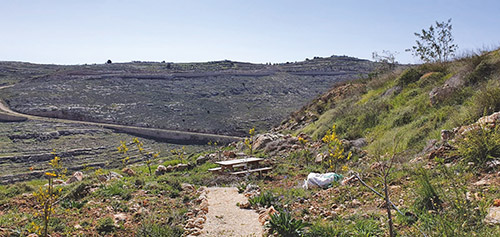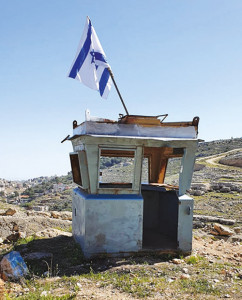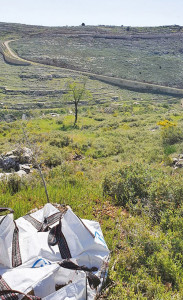
Recently, my neighbor, a soldier in the IDF, took me up to the northern slope of Dagan Hill in Efrat to show me the efforts that he and other volunteers, both young and old, make to keep the land as part of the city.
The volunteers regularly go and plant trees and set up paths. Their enthusiasm and love for the land is what keeps them coming back despite the sabotage by neighboring Arabs who seek to take control of the area. Trees planted have been regularly uprooted and the paths made by the volunteers have repeatedly been destroyed. The ground shows the remains of damage caused by Molotov cocktails thrown. Not long ago, a motorcyclist from the nearby city of Beit Lechem tossed a firebomb at recently planted trees with the clear intent of engulfing the area, including nearby homes in flames. He managed to get away. A guard booth set up by the IDF during the time of the Oslo Accords (1993) is along the path. An Israeli flag hangs upon its roof. The flag has been torn down and replaced numerous times.
In the face of all these challenges, the volunteers have not been deterred. They envision a future where these hills will be full of Jewish homes, synagogues and parks as part of the future of the city of Efrat. These dreams inspire them.

Efrat is a well established city of about 14,000 residents in the Gush Etzion region of Israel. The northern slopes of Dagan Hill are the next frontier. Dagan currently boasts about 400 homes.
The steep slopes of the northern edge of the Dagan Hill of Efrat extend down to a valley from which water flows from winter rains to the nearby Pools of Solomon. Waters were carried by aqueducts which are still visible on the steep countryside into the pools originally constructed during the era of the Chashmonaim. The pools were a major water source for Jerusalem during the era of the Second Temple, although the region itself also supplied water to Jerusalem during the First Temple.
The city has yet to receive the confirmations from the government to build upon the land, which is state land, but has not yet been zoned to Efrat for development. Presently, it is not enough to own the property on paper. If not physically held, it can belong to the next group that lays claim. The struggle is to hold onto Efrat property so it can be developed in the future.
The area of Efrat is part of what is known as “area C,” which under the Oslo Accords, Israel is supposed to have full control to plan to either develop land or to destroy illegal housing. Permission to build is often impeded by time consuming petitions filed by leftist groups such as Peace Now. Local Jewish communities such as Efrat face building delays while Arabs build illegally in an attempt to hinder the communities and impede their growth. There is also an illegal Arab building on nearby Eitam Hill. Underneath the slopes of Dagan Hill is the ancient city of Eitam that is mentioned several times in the Bible and Talmud. Less than a mile to the east is the modern hill of Eitam, which takes its name from the nearby ancient city and awaits residential development. It is a vast area which would contribute immensely to the size of Efrat.

Illegal Arab building which threatens the future development of Dagan Hill and Eitam Hill continues unabated.
According to Gidon Margalit, a local businessman who specializes in real estate in Judea and Samaria and consults with the city municipality on Efrat land-related issues, “The mission is to preserve state land that was not mapped yet by the state of Israel. Actions include squatter watch, trees planted, and paths and rest/picnic zones creation.”
Volunteers in Efrat have set up a website, Vaad Karkaot (lands committee), which describes activities of Efrat residents on the hill and in maintaining its appearance.
According to one of the volunteers who has been active in preserving the land and helping to bring volunteers to the site, “A tree, a bench, a park is a sign of a presence in the land of Israel.” The hill is “Overall, a beautiful place for people to come, volunteer and enjoy the land of Israel. To make a presence and continue to build the land of Israel.”

Margalit describes the current challenges. “While we add life, love and abundance to Jews and Arabs, the people fighting us from the Palestinian side are harvesting hate and murderous thoughts.”
Larry Domnitch is the author of “The Impact of World War One on the Jewish People” by Urim Publications. He lives in Efrat.











